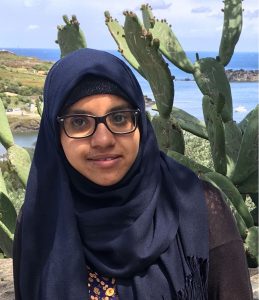
Khadija was born in Ksar Toroug, Morocco, and is a journalism degree student. He has done university internships at the Eyes of the world Foundation. For her, communication is an effective means for the empowerment of women, because communication means being informed and information makes you know, think and reflect on different aspects. Communication is also a means to propel women into action.
What is your role with Eyes of the world? How did you get in touch with the foundation?
Currently, I perform communication tasks within the foundation. I got in touch with Eyes of the world through an internship program through my university (UAB).
What work of the foundation most surprised you? Any anecdotes that have shocked you?
The work carried out by the foundation is surprising in itself, since there are few NGOs that focus on combating avoidable blindness. Often in Europe we consider poverty or lack of clean drinking water to be the main problems of low-income countries, and we forget that they also have other needs, that even if minimally addressed, can greatly improve their situation. Avoidable blindness is one of these problems, in fact, the eye diseases often attributed to age are curable, but in these low-income countries there is a lack of resources, people who suffer from the diseases do not seek out a cure, and are therefore forced to leave their jobs as the disease progresses, because they can no longer perform the necessary functions like they used to.
How do you think the universal right to ocular health could be improved? And, in particular, women’s access to eye health?
To make the universal right to ocular health effective, it is important to first give eye health the importance it deserves, as some of the problems in relation to vision often tend to be devalued. Also, awareness is fundamental, because if people are not aware that some diseases are avoidable or curable, there is a risk of naturalizing visual problems by attaching them to age for example.
With respect to access to eye health by women, I think it is important to try to improve their situation, always taking into account their culture, that is, if in a culture women are forbidden to travel, the correct thing would be to find a solution and not try to confront culture, because as much as change is urgent, cultural values are difficult to forget overnight. For this reason, the work carried out by Eyes of the world is essential, as it always tries to provide ophthalmological services to entire populations, without excluding anyone, and now also, with the new gender policy, access to eye health care for women will be guaranteed more.
From your experience, what do you think are the differences with respect to gender policy in countries in the East versus the West?
In my opinion, democracies in the West have succeeded in improving the status of women, in relation to access to education, health and the labor market, while in much of the eastern countries there are still dictatorial regimes that restrict the rights of citizens, and of women above all. Moreover, the strong cultural roots that exist in these countries of the east, hinder women’s access to different services. However, there are nuances in everything, in some countries in the West, despite gender politics, patriarchy continues to camp at ease, while in African countries, for example, there are matriarchal societies.
Can communication help the empowerment of women? How?
Yes, in fact it is one of the most effective mediums for empowerment, because communication means being informed, and information makes you know, think, and reflect on different aspects. Also, communication is a medium to encourage women to act, because if, for example, women of one town know of the struggle of women from another town, they can use them as examples. Communication create bridges and references which is why it is essential.
What three words define Eyes of the world for you?
Change, solidarity, resilience.
How do you see the future through your female eyes?
I see the future with optimism and hope, because I feel that, despite the events, there is more awareness about the role of women in societies, and I also see that many more are joining the fight against injustice.